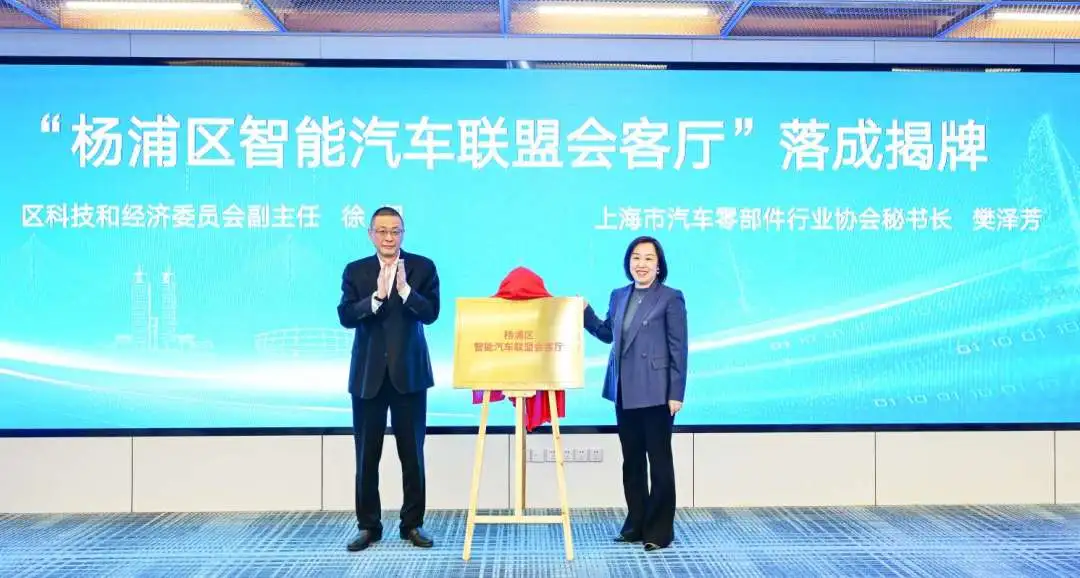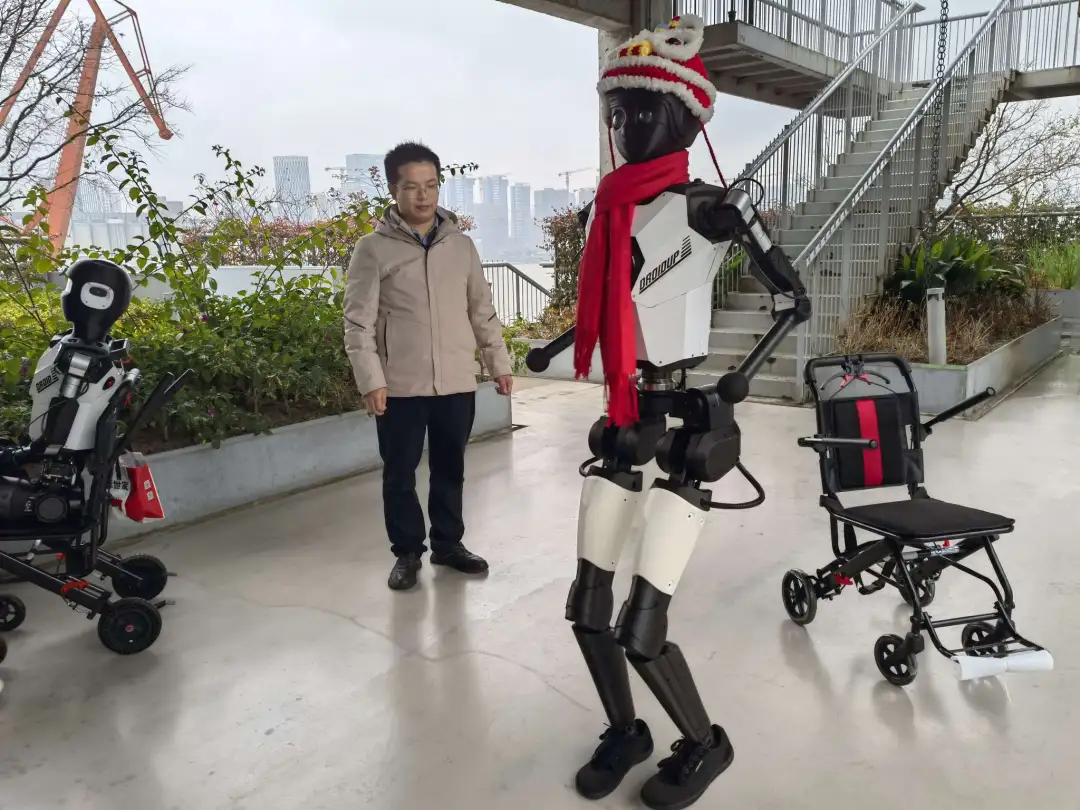Tech Hub Links Industries, Robots Enter Daily Life: Yangpu Maps "Radius" of Collaborative Innovation April 15,2025
The district has been making waves, from unveiling the Intelligent Vehicle Alliance Lounge to debuting bipedal robots along Yangpu Riverside. Yangpu's digital industry is transforming from dynamic codes in labs to tangible improvements in daily life.
In the first quarter of this year, Yangpu has been sending out strong signals of innovation. By leveraging the "power of technology", the district has infused digital elements into everyday scenarios like transportation, entertainment, and elderly care, mapping the "radius" of collaborative innovation.
From Industry Alliance to Ecosystem Co-building: Yangpu's Smart Mobility Solution
Yangpu is Shanghai's largest central urban area by size, with the highest registered population and the longest riverside. It boasts a century-old heritage in universities, industry, culture, and municipal works. Historically a leading industrial powerhouse, it was hailed as the "birthplace of modern Chinese industry", contributing one fourth of Shanghai's industrial output and one twentieth of the country's total. Today, Yangpu has reinvented itself as a hub for innovation and startups. It is home to over 8,300 digital economy companies, including major players like Douyin, Meituan, and Bilibili. The core digital industry - software and information services generated over 320 billion yuan in revenues in 2024, representing about one fifth of Shanghai's total. The district is now transitioning from "Yangshupu" to "Digital Yangpu".
At the recent Yangpu Investment Promotion Conference for Intelligent Transportation Industry Chain, the "Yangpu Intelligent Vehicle Alliance Lounge" was officially launched.

Last year, the Yangpu Intelligent Vehicle Alliance Lounge was launched with the goal of finding mutually beneficial models within the automotive supply chain and fostering cross-industry collaboration to elevate the automotive sector. The newly established alliance is set to spark more creative exchanges and business partnerships among companies in the industry.
Yangpu is now dedicated to constructing a modern industrial system centered on the digital economy, aiming to develop three 100-billion-yuan industrial clusters: the online new economy, creative design, and intelligent manufacturing. This year, the district has also incorporated emerging sectors like new energy and intelligent connected vehicles, drones, and location services into its intelligent transportation industry chain. According to Ni Bing, Member of the Standing Committee of the CPC Yangpu District Committee and Executive Deputy Head of Yangpu District, the investment promotion conference aims to create a platform for cross-industry collaboration. It also allows entrepreneurs to gain insights into Yangpu's current progress, future plans, and investment potential, thereby enhancing understanding and cooperation.
At the conference, Zong Jinliang, Chief Technology Officer of XDCar, presented a keynote speech titled "From Digitalization to Intelligence: XDCar Redefines the New Frontiers of Future Mobility". Prof. Wang Bo Prof. from the Fudan International School of Finance explored "The Development Trends of the Transportation Industry amid the Integrated Transportation of the Yangtze River Delta".
The roundtable forum featured experts and corporate representatives, who delved into critical issues such as localized advancements in intelligent driving and vehicle-road synergy, the integrated development of the smart mobility and the regional economy, and the sustainability and social impact of future urban transportation.
Unlocking Fusion of Entertainment and Culture Industry: Evolution from Physical Clustering to Chemical Integration
Recently, the Humanities and Business Salon, jointly organized by the EMBA Program of Fudan University's School of Management and STI Group, took place at Fudan University. Over a hundred entrepreneurs and industry practitioners from various segments of the industry chain convened to explore the secrets behind creating and sustaining hit IPs.
In today's rapidly evolving cultural consumption landscape, IPs have transcended their original role as entertainment content to become multifaceted "cultural symbols" with diverse commercial potential. The immense popularity of the film Ne Zha 2 has prompted extensive discussions on the creation of hit IPs.
Zheng Ming, Deputy Dean of Fudan University's School of Management, used Ne Zha 2 as a case study to highlight that the success of a hit IP hinges not only on its initial buzz but also on its ability to generate composite assets through extended industrial chain integration. "For new IPs to break through, they need a unique competitive edge. Meanwhile, building a sustainable ecosystem requires a deep understanding of user needs and a precise handle on the ever-changing market dynamics."
Recent years have seen Yangpu harness its distinctive strengths in the combination of culture with technology and universities with leading companies to vigorously advance the digital cultural and creative industry, which is defined by content technology and propelled by the online economy. Presently, the district boasts 509 cultural and creative companies, among which are industry leaders like Bilibili, ByteDance, Meituan, Tongji Architectural Design (Group) Co., Ltd., and AECOM China. The cultural and creative sector is rapidly clustering and emerging as a key driver for high-quality economic growth in the region.
"Through the creation of collaborative innovation platforms and the integration of university resources with industrial capital, our district has empowered more than 350,000 talents to seamlessly transition from creativity to practice and ultimately to commercial success, fueling the growth of the cultural and creative industry," explained Zheng Yuxiao, Party Secretary and Chairman of STI Group. Leveraging the functional zones of GKIC and Great Innovation Valley, the district has attracted leading companies like Papergames, Bilibili, and Xiaohongshu, fostering a vibrant ecosystem where art, animation, and game IPs intermingle and flourish in a harmonious blend of network culture and urban development.
In recent years, STI Group has been reshaping the regional innovation paradigm through an ecosystem-centric approach. It has forged a distinctive collaborative innovation network with local enterprises, allowing a growing number of enterprises within the innovation circle to reap the benefits of breaking through traditional boundaries. The "innovation circle" model in Yangpu has demonstrated that dismantling resource silos and fostering collective ecological development is the only way to drive the cultural and creative industry to leap from mere physical clustering to true chemical integration. Propelled by the dual engines of technology and ecology, China's cultural and creative industry is ascending to higher echelons of the global value chain. By leveraging platforms to facilitate seamless communication, STI Group has established a comprehensive ecosystem that features platforms for international cooperation and exchanges, professional talent services, and one-stop financial services. This integrated system has become a powerful engine for Yangpu's innovation-driven development strategy.
On one side, Papergames is redefining immersive experiences through the Miracle Nikki series, Bilibili is connecting global youth via ACGN, and Xiaohongshu is reshaping consumption landscapes with its content-driven ecosystem. Meanwhile, prestigious entities such as Dunhuang Contemporary Art Museum, Skynet, Invengo, Sinstant, and East West Entertainment have all set down roots in Yangpu. It is now evolving into a "tropical rainforest" where online entertainment thrives.
From Labs to Riverside: Accelerating the Application of Livelihood Scenarios
Yangpu takes pride in its century-old universities. Just as clear water flows from a fresh spring, Yangpu draws inspiration and vitality from its rich educational heritage. In 2025, seizing the opportunity of the integrated reform of education, technology, and talent mechanisms and systems, the district embarked on the development of "Digital Yangpu" New Quality Innovation Zone. This initiative aims to create an innovation ecosystem across the entire district, one that is perfectly aligned with new quality productive forces.
During the Spring Festival holiday, two new humanoid robots named "Xiao Bei" from Shanghai Droid Robot Co., Ltd. (Droid Robot) made their first public appearance along Yangpu Riverside. This marked a significant milestone in the industrial application of bipedal robots.

Established in 2021, Droid Robot has amassed over two decades of expertise in bipedal dynamic walking and cross-modal learning. The company's robots offer intelligent solutions tailored for research and education, public services, elderly care, and other applications. According to Dr. Mou Haiming, Technical Director of Droid Robot, the 1.6-meter-tall model on display boasts two significant strengths compared to other robots of similar size globally: it weighs less than 30 kilograms and has a walking endurance of over five hours. Its advanced motion control system can navigate complex terrains, including stairs, rugged paths, and outdoor slopes, at a speed of 1.5 meters per second. This model is designed to handle simple household chores and document delivery tasks.
"Our goal is to develop an 'Android system' for the robotics industry," said Mou. He highlighted that the current products are primarily designed for secondary development by research institutions and enterprises, targeting applications such as guest welcoming, performances, and patrols. In addition, the company is constructing a "platform + application" ecosystem, leveraging an open platform to attract developers and foster collaborative creation.
The "Yangpu model" of collaborative innovation that pools the efforts of the government, enterprises, universities, and research institutions offers comprehensive support for the commercialization of cutting-edge technology, bridging the gap from laboratory research to practical applications. Throughout its development, the company has benefited from extensive support from Yangpu, such as policy-related assistance, resource allocation, and access to application scenarios. As a key government-university-enterprise cooperation project in Yangpu, this launch is set to accelerate the exploration of humanoid robot applications.
At the Spring Festival Gala of the Year of the Snake, a troupe of robots dancing the Yangko dance stole the show and reignited the public's fascination with humanoid robots. Looking ahead, companies will leverage the Humanoid Robot Innovation Center, a collaborative initiative among the Yangpu Science, Technology and Economy Commission, the University of Shanghai for Science and Technology (USST), and USST National Science Park, to expedite the commercialization of research outcomes. They will seek out and expand diverse application scenarios, further integrating humanoid robots into frontline public services.
In March of this year, Yangpu convened a work seminar with USST. During the meeting, the two sides engaged in an in-depth discussion on how to foster collaborative progress in education, technological innovation, and talent development, and on how to deepen and solidify their partnership.
For many years, USST has been a key talent supplier to Yangpu, nurturing a wealth of high-caliber professionals and many outstanding enterprises led by its alumni. Moving forward, the district and university plan to jointly promote the renovation of the middle-northern section of Yangpu Riverside and the development of Fuxing Island. Their efforts will focus on integrating functions and enhancing the overall quality of the space.